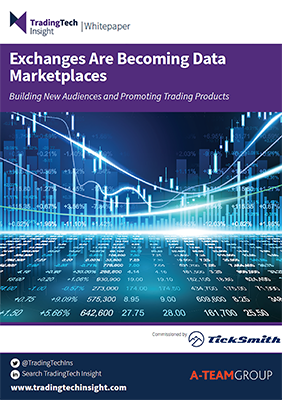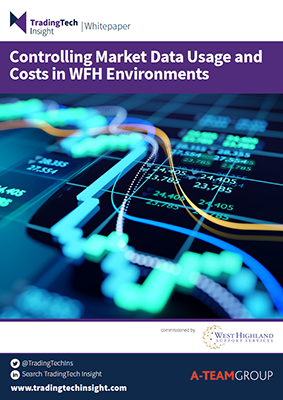TradingTech Insight Regulatory Reporting & Compliance The latest content from across the platform
B2B Data Marketplaces and Beyond
Financial institutions and corporations often generate huge quantities of data as a by product of their core activities. This data – details of historical transactions, customer interactions and metadata for referring to instruments, counterparties or entities – can provide valuable insights for industry participants, and form the basis of a meaningful data sales business. But…
Exchanges Are Becoming Data Marketplaces
Exchanges and other trading venues have long derived revenue from sales of their data; in some cases they operate substantial businesses based around sales of their real-time quotes and other market data services. But few are well set up to deal with growing demand for other datasets they may generate from their core activities, such…
Mitigating Compliance Risk by Matching Application Usage to Data Licensing Obligations
As financial institutions consume more market data from more sources than ever before, the task of administering external data services is growing both in complexity and scale. At the same time, data services are increasingly consumed by applications rather than humans, and these applications often consume more data than humans and produce derived data. As…
Controlling Market Data Usage and Costs in WFH Environments
The Covid-19 pandemic has transformed the way financial services firms operate: with staff dispersed across numerous alternative sites or working from home, and many still requiring access to fee-liable market data and other financial information services in order to function. Data managers are struggling to control access to this data – facing the risk of…
Financial Markets Operations Response to COVID-19: Best Practices for Working from Home
The COVID-19 pandemic is disrupting all walks of life, and carries with it implications for society beyond even the obvious and immediate health impact. Business is being hit across the board, with many corporations sending staff home in an effort to keep them both safe and working. It’s clear that firms can’t rely on a…
Adopting AI for Superior Reconciliations
Firms’ reconciliation and exceptions management processes are manually intensive, expensive and prone to error. With rising compliance costs and greater competition narrowing margins in financial services, firms are looking to streamline their reconciliations processes through automation, giving them the opportunity to reduce the number of exceptions they manage and the time it takes to deal…
Trade Surveillance and Mobile Recording in the Era of Data Privacy
The EU’s MiFID II and other regulations globally have placed greater emphasis than ever on market surveillance, recording of trading communications and records-retention processes in an attempt to stamp out market abuse and boost investor confidence and protections. At the same time, the public’s attitude toward data privacy has hardened, most visibly through new regulations…
Getting eComms Surveillance Right
Demand for electronic communications (eComms) surveillance has risen in response to regulatory requirements and compliance needs to pinpoint problems such as market abuse without wasting time and resources reviewing false positives. Innovative technologies such as machine learning, natural language understanding (NLU) and other strands of artificial intelligence (AI) are improving financial services firms’ ability to…
Quantity vs. Quality: An Evolving Research Paradigm
A revolution is under way in how buy-side firms conceptualize value in the research they consume. However, sell-side houses may be behind the curve in recognizing this. Driving this change in perception among buy-side firms is the EU’s Markets in Financial Instruments Directive II (MiFID II). Under MiFID II, buy-side firms have to pay for…
MiFID II: Navigating the Emerging Liquidity Landscape
The September 1 deadline for full implementation of the Systematic Internalisation (SI) regime marked the beginning of a whole new liquidity landscape, with firms on both sides of the equation grappling to understand the long-term implications of the new system on Europe’s financial markets. Navigating these waters in the coming months will be challenging for…











